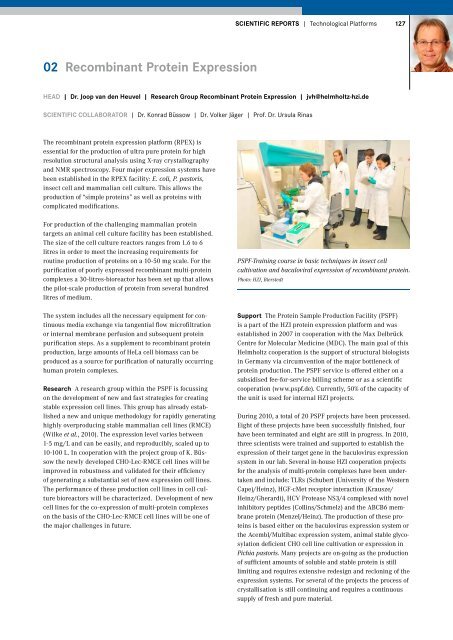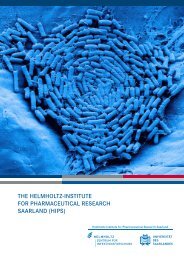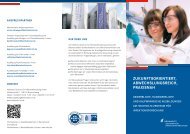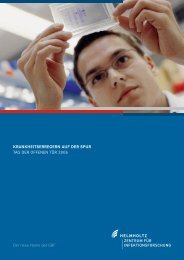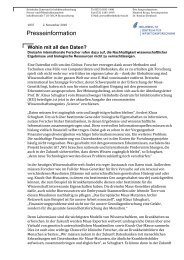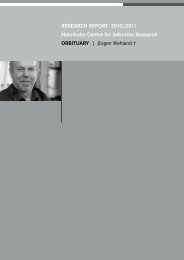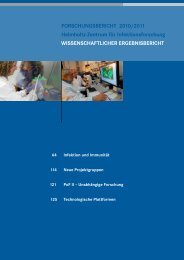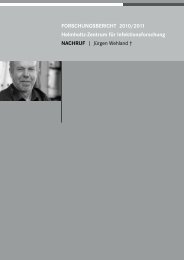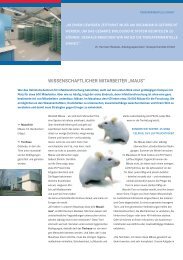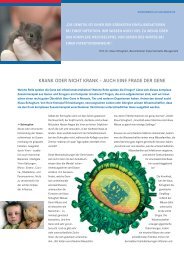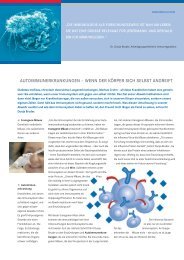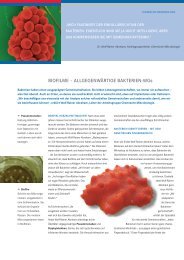Research Report 2010 2011 - Helmholtz-Zentrum für ...
Research Report 2010 2011 - Helmholtz-Zentrum für ...
Research Report 2010 2011 - Helmholtz-Zentrum für ...
You also want an ePaper? Increase the reach of your titles
YUMPU automatically turns print PDFs into web optimized ePapers that Google loves.
SCIENTIFIC REPORTS | Technological Platforms 127<br />
02 Recombinant Protein Expression<br />
HEAD | Dr. Joop van den Heuvel | <strong>Research</strong> Group Recombinant Protein Expression | jvh@helmholtz-hzi.de<br />
SCIENTIFIC COLLABORATOR | Dr. Konrad Büssow | Dr. Volker Jäger | Prof. Dr. Ursula Rinas<br />
The recombinant protein expression platform (RPEX) is<br />
essential for the production of ultra pure protein for high<br />
resolution structural analysis using X-ray crystallography<br />
and NMR spectroscopy. Four major expression systems have<br />
been established in the RPEX facility: E. coli, P. pastoris,<br />
insect cell and mammalian cell culture. This allows the<br />
production of “simple proteins” as well as proteins with<br />
complicated modifications.<br />
For production of the challenging mammalian protein<br />
targets an animal cell culture facility has been established.<br />
The size of the cell culture reactors ranges from 1.6 to 6<br />
litres in order to meet the increasing requirements for<br />
routine production of proteins on a 10-50 mg scale. For the<br />
purification of poorly expressed recombinant multi-protein<br />
complexes a 30-litres-bioreactor has been set up that allows<br />
the pilot-scale production of protein from several hundred<br />
litres of medium.<br />
The system includes all the necessary equipment for continuous<br />
media exchange via tangential flow microfiltration<br />
or internal membrane perfusion and subsequent protein<br />
purification steps. As a supplement to recombinant protein<br />
production, large amounts of HeLa cell biomass can be<br />
produced as a source for purification of naturally occurring<br />
human protein complexes.<br />
<strong>Research</strong> A research group within the PSPF is focussing<br />
on the development of new and fast strategies for creating<br />
stable expression cell lines. This group has already established<br />
a new and unique methodology for rapidly generating<br />
highly overproducing stable mammalian cell lines (RMCE)<br />
(Wilke et al., <strong>2010</strong>). The expression level varies between<br />
1-5 mg/L and can be easily, and reproducibly, scaled up to<br />
10-100 L. In cooperation with the project group of K. Büssow<br />
the newly developed CHO-Lec-RMCE cell lines will be<br />
improved in robustness and validated for their efficiency<br />
of generating a substantial set of new expression cell lines.<br />
The performance of these production cell lines in cell culture<br />
bioreactors will be characterized. Development of new<br />
cell lines for the co-expression of multi-protein complexes<br />
on the basis of the CHO-Lec-RMCE cell lines will be one of<br />
the major challenges in future.<br />
PSPF-Training course in basic techniques in insect cell<br />
cultivation and baculoviral expression of recombinant protein.<br />
Photo: HZI, Bierstedt<br />
Support The Protein Sample Production Facility (PSPF)<br />
is a part of the HZI protein expression platform and was<br />
established in 2007 in cooperation with the Max Delbrück<br />
Centre for Molecular Medicine (MDC). The main goal of this<br />
<strong>Helmholtz</strong> cooperation is the support of structural biologists<br />
in Germany via circumvention of the major bottleneck of<br />
protein production. The PSPF service is offered either on a<br />
subsidised fee-for-service billing scheme or as a scientific<br />
cooperation (www.pspf.de). Currently, 50% of the capacity of<br />
the unit is used for internal HZI projects.<br />
During <strong>2010</strong>, a total of 20 PSPF projects have been processed.<br />
Eight of these projects have been successfully finished, four<br />
have been terminated and eight are still in progress. In <strong>2010</strong>,<br />
three scientists were trained and supported to establish the<br />
expression of their target gene in the baculovirus expression<br />
system in our lab. Several in-house HZI cooperation projects<br />
for the analysis of multi-protein complexes have been undertaken<br />
and include: TLRs (Schubert (University of the Western<br />
Cape)/Heinz), HGF-cMet receptor interaction (Krausze/<br />
Heinz/Gherardi), HCV Protease NS3/4 complexed with novel<br />
inhibitory peptides (Collins/Schmelz) and the ABCB6 membrane<br />
protein (Menzel/Heinz). The production of these proteins<br />
is based either on the baculovirus expression system or<br />
the Acembl/Multibac expression system, animal stable glycosylation<br />
deficient CHO cell line cultivation or expression in<br />
Pichia pastoris. Many projects are on-going as the production<br />
of sufficient amounts of soluble and stable protein is still<br />
limiting and requires extensive redesign and recloning of the<br />
expression systems. For several of the projects the process of<br />
crystallisation is still continuing and requires a continuous<br />
supply of fresh and pure material.


